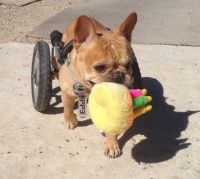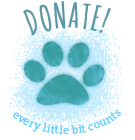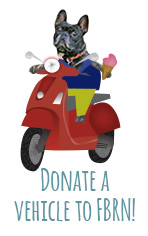Spine-injured, Disabled, and Cart dogs
If you’ve followed FBRN for a while, you will have noticed that the number of dogs on our roster who have spinal injuries has increased. The reasons for that increase don’t have to be spelled out (let’s just say it’s a really good idea to research your breeder, learn lots about Frenchies before you buy one, and be sure to get doggy health insurance if you don’t have $12,000 on hand or available on your credit card. Assume you will need a doggy MRI to the tune of $3,000 -$5,000 at some point in your Frenchie’s life. You should also have a serious internal discussion about whether you can face caring for a disabled frogdog in the event your dog is injured, or develops IVDD and surgery is not successful).
 Our spine-injured dogs, some of which use carts, so we call them "cart dogs", are happy as clams. They are not in pain. Most of them only use their carts when it’s time for exercise. Inside the house, spine-injured dogs' mobility ranges from wobbly walkers to back-end draggers, but they get around. Likewise, there is a great variation in bowel and bladder control. Some of our dogs have good bladder control but no bowel control, some have bowel and bladder control, and some have neither. You will see that some of our spine-injured dogs wear diapers or belly bands indoors. For dogs without bladder control, the owner gives the dog a helping hand by expressing the bladder. There are videos on Youtube illustrating the method, but your vet will show you how and can correct your form as you learn.
Our spine-injured dogs, some of which use carts, so we call them "cart dogs", are happy as clams. They are not in pain. Most of them only use their carts when it’s time for exercise. Inside the house, spine-injured dogs' mobility ranges from wobbly walkers to back-end draggers, but they get around. Likewise, there is a great variation in bowel and bladder control. Some of our dogs have good bladder control but no bowel control, some have bowel and bladder control, and some have neither. You will see that some of our spine-injured dogs wear diapers or belly bands indoors. For dogs without bladder control, the owner gives the dog a helping hand by expressing the bladder. There are videos on Youtube illustrating the method, but your vet will show you how and can correct your form as you learn.
Over the past few years, we’ve seen a true cultural shift in dog-owners’ attitudes toward disabled dogs. Where once dog owners saw disabled dogs as unhappy and suffering, and thought the kindest thing to do was euthanize a disabled pet, we’ve seen a sea-change in both owners and potential adopters. Where once a cart dog spent many, many months on the Available page, our cart dogs now spend far less time waiting for their forever families to find them.
Here is a letter from one of our volunteers who is living with a cart dog:
“If you are considering adopting a cart dog, congratulations and thank you! In the beginning it might be an adjustment, but routines are everything, and now that I have a routine, it's almost like my pup isn't even in a cart. Thankfully, small Frenchies are pretty portable, so I often carry him wherever he can't go in his cart. And he can go A LOT of places in his cart. We live on 5 acres of desert, and he can go most everywhere.
“Dozer is a 7-year-old male Frenchie who went down in his back end 48 hours after sustaining a fall off the bed onto padded carpet one year ago. I have had him since he was 4 months old, so I had already mentally accepted the possibility of his life in a cart even before I knew surgery and other therapies hadn't worked. Never once did I contemplate euthanasia as an option. I feel absolute pride when I take him out in his cart and people see how well he does. Many express feelings of sympathy, but I tell them he's still the same pup, only faster. He still loves to play and has the same spunky personality. Dogs live in 'the now.'
“He has only been in his cart for a year, so I haven't noticed many changes in our routine from the first day to now. It has gotten a little faster/easier because my bladder expressing technique has improved. He has gained strength; he is much more muscular through his chest and forelegs due to the cart, so I massage those muscles frequently to keep them loose and injury free.
“Finding someone who can express your dog’s bladder while you’re on vacation may be harder than finding an ordinary boarding situation or leaving your dog with family. Thankfully, we have someone we know and trust, but this is a possible major expense ($40-80/day) to keep in mind. But that is really the only majordifference—in the past, my parents watched our dogs at no charge.
“In terms of his health, I do have to watch for sores from his dragging his body across our tiled floors (no carpet is a MUST with bowel incontinent dogs) but there are "drag bags"—sacks that fit over the lower body--you can easily make or buy to help prevent friction. I would also say providing proper nutrition is vital to ensure muscle health. A couple of nice, thick beds around the house help prevent pressure on his joints when he is lying down.
“I have been thinking very hard about what I would specifically tell people who want to adopt a cart dog. Since the changes that came with a cart dog have become second nature this past year, I don't find it an inconvenience at all in my lifestyle or routine. Perhaps the biggest change is expressing Dozer’s bladder. My veterinary neuro surgeon only has me expressing his bladder twice a day (which is very convenient for my schedule), and I have not had any issues with urinary tract infections. UTI’s are common and can be more serious in paralyzed pups, so learning the signs of a UTI will be an important new skill if you adopt a cart dog.
“I do consider myself a very dedicated, committed, and conscientious dog lover, and though I work full time, I can take time for myself—caring for Dozer is not a job that consumes my whole life. While expense may be an issue (as with any dog’s physical affliction, e.g., allergies), I think commitment and patience are especially important qualities to have with a cart pup. More frequent outings for bowel evacuation may be necessary, and there may be indoor accidents, depending on your dog’s injury and condition. My husband wanted me to add: “Be ready to buy lots of baby wipes and stock them in various areas of your house and car for easy retrieval. Preparedness is key for those times they are needed.”
Dozer’s owners experience is unique, as is every dog owner’s time with any dog. If you are curious about a cart dog, read the bio carefully, address the concerns in the bio, apply, and see what happens. You’ll have lots of opportunities to talk with the foster parent about life with a cart dog during the interview and adoption process.
We have recently taken in 3 dogs whose spine injuries vary from serious to relatively minor. If you have seen a Frenchie, a Doxie, a Corgi—all dogs with a reputation for spine injuries-- or any other dog rolling along at a happy clip in your nearby park, you can see that there’s no reason to pity them or make a sad face as they go by. Dogs enjoy the moment, and cart dogs may have a great lesson to teach us about accepting what is and rolling with what comes.






